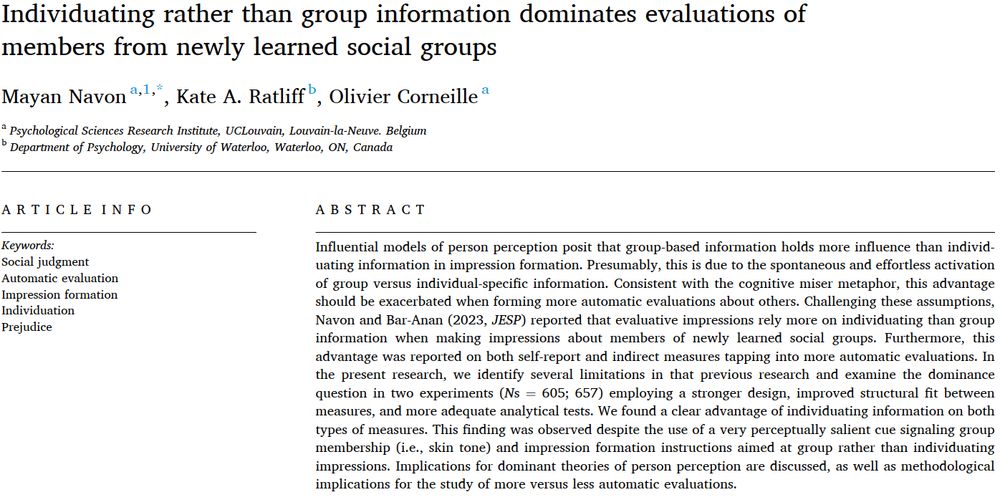stereotyping\prejudice, attitudes, intergroup relations.
Mother, Firstgen, Israeli

Classic person perception models argue that group information (e.g., group valence) dominates impression formation, especially in less-than-optimal conditions. But is this really the case?
👉 Read the full paper
authors.elsevier.com/a/1m66p51f8w...
doi.org/10.1177/1088...

doi.org/10.1177/1088...
We offer a broad and structured discussion of leading methods developed in the past >60 years to tackle demand artifacts in psychological research and beyond.
doi.org/10.31234/osf...
We offer a broad and structured discussion of leading methods developed in the past >60 years to tackle demand artifacts in psychological research and beyond.
doi.org/10.31234/osf...
Statements - true and false - are rated as more true after their pairing with positive than negative pictures.
This effect bridges research on evaluative conditioning and misinformation.
osf.io/preprints/ps...


Statements - true and false - are rated as more true after their pairing with positive than negative pictures.
This effect bridges research on evaluative conditioning and misinformation.
osf.io/preprints/ps...
Classic person perception models argue that group information (e.g., group valence) dominates impression formation, especially in less-than-optimal conditions. But is this really the case?
👉 Read the full paper
authors.elsevier.com/a/1m66p51f8w...

Classic person perception models argue that group information (e.g., group valence) dominates impression formation, especially in less-than-optimal conditions. But is this really the case?
👉 Read the full paper
authors.elsevier.com/a/1m66p51f8w...

Classic person perception models argue that group information (e.g., group valence) dominates impression formation, especially in less-than-optimal conditions. But is this really the case?
👉 Read the full paper
authors.elsevier.com/a/1m66p51f8w...

Classic person perception models argue that group information (e.g., group valence) dominates impression formation, especially in less-than-optimal conditions. But is this really the case?
👉 Read the full paper
authors.elsevier.com/a/1m66p51f8w...
Special issue on "Intersectionality in Social Psychology: Perspectives, Methods, and Applications" in the British Journal of Social Psychology.
Abstract submission deadline: 15 December 2025

Special issue on "Intersectionality in Social Psychology: Perspectives, Methods, and Applications" in the British Journal of Social Psychology.
Abstract submission deadline: 15 December 2025
Martijn van Zomeren and @ayseuskul.bsky.social introduce the ERSP special issue on theorizing in social psychology.
#SocialPsyc

Martijn van Zomeren and @ayseuskul.bsky.social introduce the ERSP special issue on theorizing in social psychology.
#SocialPsyc
Then you might be interested in joining our collaborative study!
Follow the link for more information: tilburgss.co1.qualtrics.com/jfe/form/SV_...
#socialpsyc #PsychSciSky

Then you might be interested in joining our collaborative study!
Follow the link for more information: tilburgss.co1.qualtrics.com/jfe/form/SV_...
#socialpsyc #PsychSciSky

"Demand artifacts need not be seen only as a vexing problem. Precisely because they are so conceptually and methodologically challenging, they represent an opportunity for methodological and theoretical development."
#SocialPsyc

"Demand artifacts need not be seen only as a vexing problem. Precisely because they are so conceptually and methodologically challenging, they represent an opportunity for methodological and theoretical development."
#SocialPsyc
moralconsortium.psu.edu 1/n

moralconsortium.psu.edu 1/n
uni-tuebingen.de/en/research/...
uni-tuebingen.de/en/research/...
#SocialPsychology #AcademicSky
openpublishing.princeton.edu/projects/the...

#SocialPsychology #AcademicSky
openpublishing.princeton.edu/projects/the...

✨ Professorin/Professor (w/m/d) - W2-Professur für Sozialpsychologie
Deadline: 2025-05-22
Location: Germany, Würzburg, Bayern
www.academiceurope.com/job/?id=7494
#hiring #THWS #Socialpsychology #socialscience #Psychology #professor

✨ Professorin/Professor (w/m/d) - W2-Professur für Sozialpsychologie
Deadline: 2025-05-22
Location: Germany, Würzburg, Bayern
www.academiceurope.com/job/?id=7494
#hiring #THWS #Socialpsychology #socialscience #Psychology #professor
Drs. Jordan Axt and Eric Hehman are seeking applications for a jointly funded Post-Doctoral Researcher, beginning Fall 2025.
Topic area would broadly be centered on intergroup dynamics and prejudice.
1/2
Drs. Jordan Axt and Eric Hehman are seeking applications for a jointly funded Post-Doctoral Researcher, beginning Fall 2025.
Topic area would broadly be centered on intergroup dynamics and prejudice.
1/2
Correspondence: go.nature.com/4brCRzX
Author reply: go.nature.com/3DilAN0

Correspondence: go.nature.com/4brCRzX
Author reply: go.nature.com/3DilAN0
Open access: doi.org/10.1038/s415...
#SocialPsyc #Psychology #AcademicSky 🧪

Open access: doi.org/10.1038/s415...
#SocialPsyc #Psychology #AcademicSky 🧪

examining the effects of individuation vs. group information on evaluations of novel individuals, as measured with direct vs. indirect measures of evaluation.
Preprint 👉 doi.org/10.31234/osf...
examining the effects of individuation vs. group information on evaluations of novel individuals, as measured with direct vs. indirect measures of evaluation.
Preprint 👉 doi.org/10.31234/osf...
Does repeated rehearsal of attitude expression increase its automaticity? -- Evidence are mixed!
'The Effect of Practice on Automatic Evaluation: A Registered Replication', recently accepted to JESP
@AnatShechter @Yoav Bar-Anan & myself.
👉 osf.io/preprints/ps...

Does repeated rehearsal of attitude expression increase its automaticity? -- Evidence are mixed!
'The Effect of Practice on Automatic Evaluation: A Registered Replication', recently accepted to JESP
@AnatShechter @Yoav Bar-Anan & myself.
👉 osf.io/preprints/ps...

